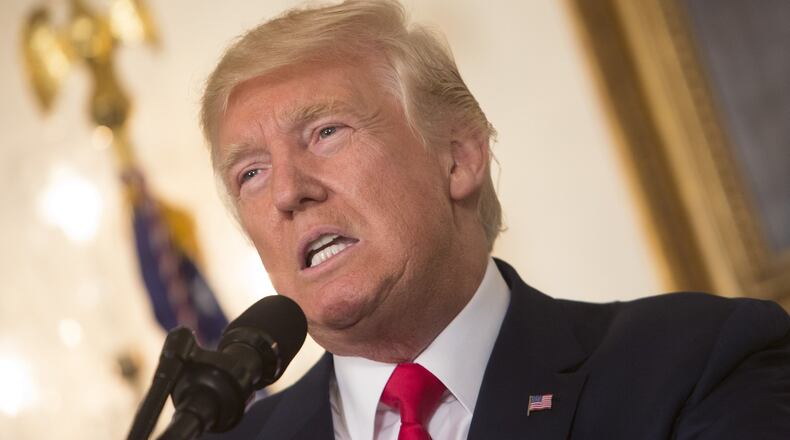President Donald Trump took a swipe at former President Barack Obama as he renewed his pledge to tackle the opioid epidemic.
Trump said, speaking after a briefing on the issue, that opioid overdose deaths have nearly quadrupled since 1999 but overall drug prosecutions declined in recent years — a trend Trump vowed to reverse.
We found Trump is correct that federal drug prosecutions declined from 2011 to 2016 under Obama, but he lacks evidence to prove that’s the culprit for the opioid crisis. A White House spokesman declined to comment on the record.
The Justice Department filed drug charges against 24,638 defendants in 2016, down 23 percent from 2011, according to the Pew Research Center, which analyzed federal data. The data reflect felonies and some serious misdemeanors.
But that’s overall drug prosecutions, not just those related to opioids, and it only includes federal prosecutions. The vast majority of criminal prosecutions are in state courts.
We found the drop was due to some specific actions the Obama administration took to stop the prosecution of low-level offenders.
Pew noted that in 2013, Attorney General Eric Holder directed federal prosecutors to ensure each case they brought served “a substantial federal interest.” Holder mandated that low-level nonviolent drug offenders with no ties to gangs or cartels would no longer face mandatory minimum sentences. He called for more treatment and alternatives to prison. And U.S. Deputy Attorney General James Cole directed attorneys in marijuana cases to focus on cartels or other organizations using violence to distribute it. Federal marijuana prosecutions fell to 5,158 in 2016, down 39 percent from five years earlier, Pew found.
Trump implied lack of prosecutions likely led to a worsening of the opioid crisis. But experts we contacted had a different view.
“No serious analyst would argue that federal prosecutions have consequences for opioid overdoses,” said University of Maryland criminology professor Peter Reuter. “The drivers of that increase are the arrival of fentanyl, since about 2012, and the overprescription of opioids before it … No prior effort against high-level distributors and traffickers has ever had sustained success at the retail level.”
Dr. Andrew Kolodny, co-director of opioid policy research at Brandeis University’s Heller School for Social Policy and Management, said, “Obama deserves blame for neglecting the epidemic and failing to ensure a coordinated federal response. I can think of several areas where it’s fair to criticize him. The decline in federal drug prosecutions is not one of them.”
Trump has a point that the Obama administration was slow to respond to the opioid crisis, said Jon Caulkins, a Carnegie Mellon professor and expert on drug policy.
“Anyone looking at the basic death stats knew we had a problem by 2000,” Caulkins said. “So this is a national disgrace, and Obama was in power for eight of the more recent years, and if ‘the buck stops on the president’s desk,’ then it’s fair to put some blame there.”
A September 2016 report from the Justice Department found prosecutors could help combat the epidemic by prioritizing prosecution of heroin distributors and medical professionals who improperly prescribe opioids. It said federal prosecution had “lagged,” and more prosecutors were needed.
Our ruling
Federal drug charges overall declined 23 percent between 2011 and 2016. But Trump misses the mark in suggesting the drop in prosecutions is to blame for the opioid epidemic, which started before Obama’s tenure and grew worse during his presidency. Obama could have done more earlier to address the epidemic, experts said, but there is no evidence that his drug-prosecution strategy led to a spike in opioid overdose deaths.
We rate this claim Half True.
“At the end of 2016, there were 23 percent fewer federal prosecutions than in 2011, so (prosecutors) looked at this scourge (opioid deaths) and they let it go by.”
— Donald Trump on Tuesday, Aug. 8, 2017 in a briefing on opioids
About the Author
The Latest
Featured


